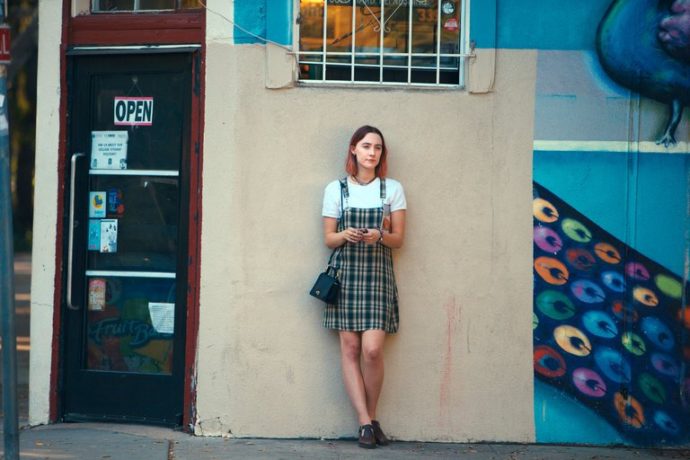Late high school is one of the most confusing times in any person’s life. You think you know all of the answers, but you really don’t. You think you are completely independent, but you really aren’t. You think you know what’s best for you, and while at times you’re right, you make a ton of mistakes along the way. Few features are able to pull off this confusing time period and age, but Greta Gerwig’s Lady Bird truly represents this complex world in a way that is clever and hilarious, but also touching and emotional.
Saoirse Ronan plays Christine “Lady Bird” Johnson, who is not named after the famous First Lady of the same name, is a high schooler in a Catholic school attempting to find her way to a college degree in an East Coast school. It is through the character of Lady Bird that Ronan delivers one of the best performances of 2017, and further proves the young actress is a force to be reckoned with. Watching her, the audience sees Lady Bird as someone fierce, fiery, and free-spirited, but still confused, conflicted, and unsure of herself, a seamless blend that cements Lady Bird as a fascinating and charming, yet still realistic protagonist. Even further shown by her working off of her mother Marion, played by Laurie Metcalf. Dealing with economic issues and a distant teenage daughter, Metcalf gives a subtle showcase of motherhood that rings true for many real-life mothers, as Marion is able to come across as a sympathetic character that is just as endearing as Lady Bird herself.
However, the one element that really makes Lady Bird so enjoyable is Gerwig’s direction and the world she creates around Lady Bird. Not just in the memorable supporting cast, with Beanie Feldstein and Tracy Letts as the particular highlights, and not just in the post-9/11 2002-2003 time period that offers a fresh take from the usual present-day settings found with most coming of age stories, but in the realistic depictions of moments that seem to be of utmost importance. In a sequence where Lady Bird loses her virginity to the handsome, edgy musician Kyle, played by Timothee Chalamet, she realizes that this supposedly magical moment had zero spark. It didn’t have any emotional core to it. It didn’t play out like in the movies. It was just “unspecial sex.” Several other moments throughout the film ring back to that incredible sequence. Lady Bird’s discovery of herself and what’s truly important to her is a problem that rings true for many young adults, and it is through Gerwig’s writing that it’s revealed that the moments that seem big are nothing more than just all of the other moments sprinkled throughout day to day life, and in the end, the moments that seem insignificant are the most memorable and most poignant.
Lady Bird does have issues once it comes to its overlong epilogue that drastically harms the pacing, although it admittedly does offer a beautiful conclusion which brings the film’s events full circle in a beautiful way. But even with a shaky ending, there’s so much to enjoy and appreciate in a film that realistically depicts the real issues suburban teenage girls have to go through, in a way that’s clever, but never unrealistic, as well as being unable to talk down to its audiences, all seamed together with an incredible mother-daughter team of actors and characters. As a directorial debut, Greta Gerwig has already cemented herself as an exciting director, and with the film’s breakout success at the Golden Globes (in spite of a glaring snub in the Best Director category) and likely at the Academy Awards, it’ll be interesting to see how Gerwig will follow up such a smart and well-written feature.
